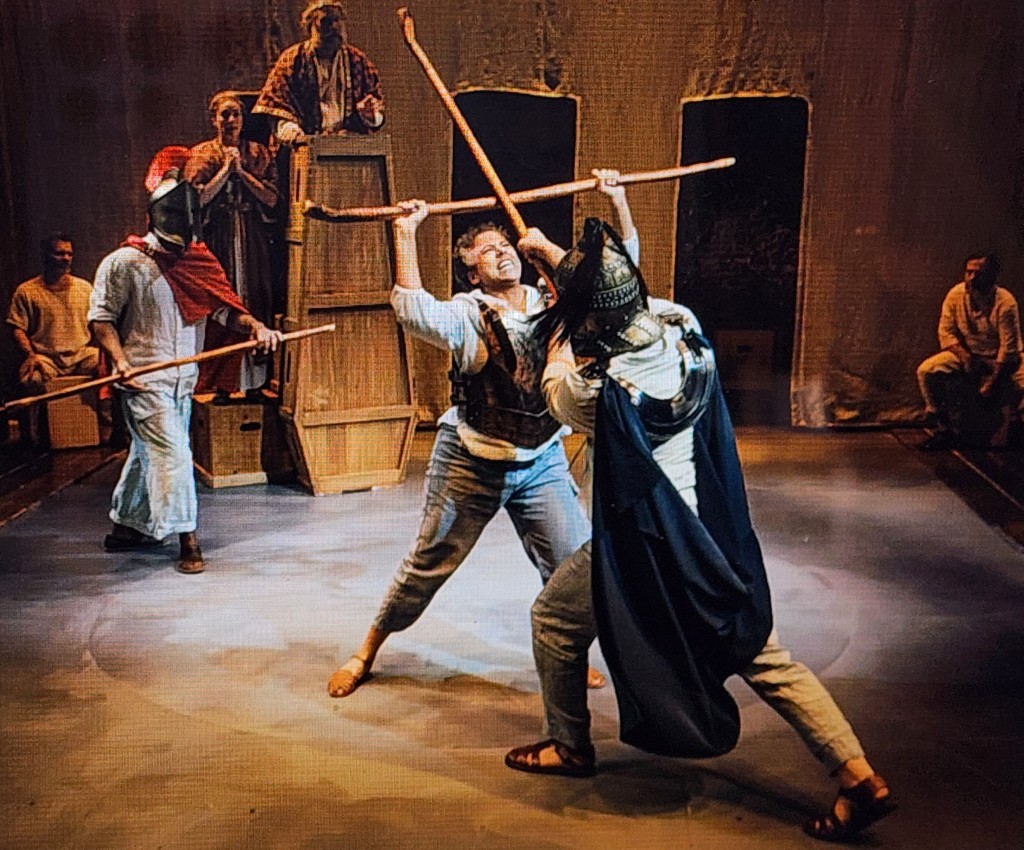Blog Archives
‘Pericles’ by Fiasco Theater a Joyful, Redemptive Must-See at CSC

Fiasco Theater’s Pericles presented by CSC is one of William Shakespeare’s works written in the twilight of his career that reveals a “hero” who the fates torment and play with until it is enough, and he receives his wish of a fulfilled life with family. The production directed by Ben Steinfeld is stylized and cleverly wrought, advancing storms, shipwrecks, kidnappings and more with the ingenuity and charm joyfully delivered with as little forced spectacle as possible, yet with an intriguing, bold and seamless minimal set and prop design. Currently at CSC until March 24, this is a must see which Fiasco has brought for us to appreciate.
Steinfeld is Gower, the troubadour whose tale this is. Through his music, lyrics and poetry he sets up the play and requires the audience to use their imagination to become involved with Pericles of Tyre’s harrowing and amazing adventures of a lifetime. Steinfeld’s Gower introduces every section and gives a summation of events essentially cluing in and reminding the audience to stay focused and attentive. He leads the cast in song initially and establishes the mood for each of the acts, making sure to recap the events in rhyme after the audience returns from the 10 minute intermission before Act 2.
There are four actors who portray Pericles and give their timber to each scene and adventure that Pericles experiences as he goes on a hero’s journey learning wisdom, perseverance, patience and fortitude, struggling to overcome whatever Fortune brings.

The first Pericles is Paco Tolson who journeys to the kingdom of Antioch where he must solve a riddle to marry King Antiochus’ (Noah Brody) beautiful daughter (Emily Young). If he doesn’t solve the riddle, he forfeits his life and hangs like the other suitors in the public square which the creative team and actors simplistically yet fearfully stage with staffs and boxes/crates. Hearing the riddle, Pericles shows his brilliance apart from all the suitors who have courted the king’s daughter and died. He understands King Antiochus’ treachery. The riddle infers the king’s incestuous relations with his daughter, who he will never give to a suitor.
Upon realizing this horrid circumstance, Pericles also realizes his own fate. Either way, if he reveals the riddle and exposes the king’s sin to public humiliation or doesn’t, he’s a dead man.
Making his excuses, Pericles ends up escaping Antiochus’ kingdom. He intuits the king will figure out why he left and come after him, so Pericles goes on a journey to Tarsus where King Cleon (Devin E. Haqq) and Dionyza (Titiana Wechsler) make their home and suffer through the dire misery of famine that has struck their lands. Knowing their plight, Pericles brings corn to Tarsus’ starving people and saves them from death. Forever grateful, King Cleon makes Pericles revered and celebrated in the land with friendship and goodness. However, we learn that kings are political and variable and circumstances change to sever the friendship.

For the moment in his life’s travels Pericles is unaware of the possibility of deceit and betrayal. Called back to his home in Tyre by the administrator he left in charge, Helicanus (Paul L Coffey), Pericles once more bares himself to Neptune’s wrath on the fickle Mediterranean where the god upends and destroys his ship. Fiasco Theater’s inventiveness of Pericles braving the storm’s fury (Mextly Couzin’s lighting design and the Fiasco’s production design), using a bolt of cloth to suggest the tempestuous waves, maintains the stylized, roughly-hewn playfulness of the production. The soft, shimmery cloth symbolizing the waves belies the irony of Pericles’ situation on the roiling sea.
Pericles loses everything but his life and is washed up on the shores of Pentapolis. There, he is at the mercy of the fishermen who find him and change his fortune with happy information. Pentapolis is ruled by the goodly King Simonedes, (the humorous Andy Grotelueschen), a pleasant reversal of the kings who have gone before.
Shakespeare contrasts the kingdoms and their kings: the first is a lecherous murderer, the second variable in deceit and this third king. The fun loving Simonedes is popular even to the lowly fishermen who tell Pericles that the king holds a tournament and feast for his daughter’s birthday. The celebration is so that Thaisa (Jessie Austrian) may find suitors among the knights who joust for her. When Pericles’ armor washes ashore, the fishermen encourage him to compete for the king’s daughter. Shakespeare makes it a key point that though he is a stranger (an migrant) in their midst, he receives their country’s hospitality and mirth.
Pericles wins the jousting matches, performed with the sames staves Fiasco used to suggest the suitors’s hanging in Antioch. It is an example of how the theater company employs the props efficiently and meaningfully to emphasize themes of power, leadership and control. Through their variable exchange we note the contrast between the kingdoms and their rulers’ leadership, either deceitfully tyrannical or happily beneficent.
After the tournament, King Simonedes invites all the knights for a feast. The wooden crates which have been used as a throne, to circumscribe walls, etc., are now used to effect a long feast table. And there, Pericles (Titiana Wechsler portrays Pericles in this segment) gains the king’s favor and the love of Thaisa.

For his pains and pleasure, the Simonedes playfully uses reverse psychology to have the couple declare their love to each other by pretending to forbid their union. Jokingly, he reveals his pleasure at their marriage which produces an heir. In the next scene we see that a pregnant Thaisa, and husband Pericles (Noah Brody in this version) go on an ocean voyage back to Tyre to check on his kingdom.
Again, there is a storm at sea and dire circumstances. Thaisa who dies in childbirth must be thrown overboard to steady the ballast or the ship will sink. Pericles prepares her coffin with spices and jewels with a note to whomever finds the coffin to bury his wife whom he greatly loves. The child who was born as Thaisa died Pericles names Marina. To redeem the time, Pericles leaves Marina with those who revere him in the land of Tarsus. King Cleon and Dionyza promise to care for Marina like she is their own, while he returns to rule Tyre.

The staging of the scene where Marina is given to King Cleon is simultaneously juxtaposed with the fate of Thaisa whose coffin washes ashore at Ephesus. The director makes excellent use of the space at CSC to clarify what happens. As Pericles hands over baby Marina to his friends, a woman with powers of healing (Tatiana Wechsler with hair down in flowing priestly robes) restores Thaisa back to life. So thankful is Thaisa that she becomes a devotee of Diana and officiates at her temple. Meanwhile, Pericles is heartbroken and grieves his dead wife but joys that his child is being raised well. As fate would have it, during the fifteen years Marina has been brought up with the daughter of Dionyza, things grow problematic.
Dionyza envies Marina’s beauty and talents and decides she must be murdered for the sake of her own daughter, so their child will shine if the glory of Marina is removed. Though Cleon opposes Dionyza’s evil act, he is powerless to stop her. But just as Marina is about to be killed, pirates kidnap her and thwart the murder. In the following sequences, Gower shifts the mood once more and the riotous humor of how Marina’s chastity is used to great effect proves comical in a brothel run by Bolt (Andy Grotelueschen) and Bawd (Jessie Austrian). There, Emily Young’s Marina turns away the lusty, hot clients who are horrified that she pushes her virginity onto them and attempts to make them Diana (the feminist of the time) devotees. Of course the irony is that Thasia, her mother, is back in Ephesus praying as a Diana devotee.

In the second act, Fiasco’s farcical skills shine and the atmosphere shifts from Fate’s woes to merriment at those lecherous males who should be ridiculed for their unseemliness. However, when it is least expected, Pericles, who returns to Tarsus to bring his daughter back to Tyre to rule with him, discovers through Cleon that Marina drowned. Indeed, King Cleon and his wife have betrayed Pericles’ goodness and there is no punishment for them as there was for King Antiochus who the gods burned up. It would seem that incest is the worst crime when it begets murder. Dionyza’s intention of murder the wicked pirates interrupted; it is an irony is that the pirates evil act is turned around for goodness. Dionyza’s envy and murderous intention the gods leave to her and Cleon’s consciences to seek redemption.
Inconsolable that she is gone, Pericles (an excellent David E. Haqq in the last, most emotional segment) will not speak and is dead in spirit. How events change magically to effect Pericles’ reunion with his wife and daughter is poignant and heart-rending, if not fanciful in hope. Interestingly, Shakespeare makes abundant use of the Deus ex Machina (the gods interrupt evil fate to save the hero) in Pericles. As Gower and the cast conclude the tale of Pericles, King of Tyre, we are uplifted by the grace of a happy ending, and the redemption offered to Marina, Pericles and Thaisa because of their goodness, devotion to the values of truth, generosity, decency and steadfastness.

The strengths of this production include the fine ensemble’s seamless acting which provides the coherence throughout, even though the character of Pericles has four actors which was initially confusing. The whimsical and at times farcical, lighthearted approach toward myth-making and storytelling through music, rhyme, dance and song are superbly balanced throughout. The stylization is the correct choice for a play that gyrates throughout voyage, disaster, and roller coaster storms that metaphorically parallel human joys and sorrows.
That the play has been spurned as silly and not worthy of being produced has been a misread of the depth of one of Shakespeare’s most trenchant latter plays. The life theme is an important one. For those who patiently endure, they gain wisdom in temperance and the power to face and overcome trials of their faith. The obstacles help one all the more appreciate and be grateful for a life that acknowledges human beings live on the brink of peril every moment of their lives. To be numb to that knowledge is to live a zombie death in life.
This is a must-see, for the music, songs, fantasy, laughter and fanciful, profound truth-telling.
Pericles. CSC, 136 E 13th St between Third and Fourth Avenues. Closes March 24th. https://www.classicstage.org/pericles/
‘Macbeth,’ by William Shakespeare, Starring Corey Stoll, Nadia Bowers at CSC

Nadia Bowers, Corey Stoll in Shakespeare’s ‘Macbeth’ directed by John Doyle at CSC (Joan Marcus)
Macbeth directed by John Doyle currently runs at Classic Stage Company. The production is minimalistic. It is stylized toward removing any extraneous feature that would slow down the race toward the conclusion of one of the most performed of Shakespeare’s plays. The production clocks in at a slim 90 minutes with no intermission, few props, the barest scenic design, no bulky Byzantine elements or interpretations. It eschews the spectacle, sturm und drang of previous maverick, heavy-handed iterations of Macbeth that have come to New York- Broadway, Lincoln Center or Off Broadway stages in recent years or have been presented at the Armory. Only the costumes whisper Scotland with each of the actors sporting a plaid tartan shawl and appropriate dress.
For those very familiar with the “Scottish Play,” this spare production will be fascinating. Its emphasis resides in the fine performances of Corey Stoll as Macbeth, his partner Nadia Bowers as Lady Macbeth, Eric Lochtefeld as Banquo and the adroit ensemble. For those unfamiliar with Macbeth who are looking to become more acquainted with the play, that has superstitious actors refusing to speak the title anywhere near a theater stage, this is not the production to see. Better to see a film version to get a handle on the plot, characterizations and themes before you stop in to see the CSC production. Then you will be able to understand and appreciate Doyle’s direction that concentrates on the grist of Shakespeare’s arc of development and characterizations, especially of Macbeth and Lady Macbeth.

Mary Beth Peil in ‘Macbeth’ by William Shakespeare directed by John Doyle, CSC (Joan Marcus)
There are many fine films of Macbeth; one directed by and starring Orsen Welles (1948); Roman Polanski’s Macbeth (1971), and most recently an incredibly visual and cinematic Macbeth starring Michael Fassbender directed by Justin Kurzel (2015). There is even a sardonic, comedic take-off on Macbeth (Scotland, PA, a film-2001), and the Off Broadway comedic musical adapted from the 2001 film currently running at the Laura Pels Theatre, Harold and Miriam Steinberg Center for Theatre.
Knowing the play as well as I do, I had little difficulty in appreciating the singularity of the performances and the rapid pacing of the events which fall in on themselves from scene to scene like dominoes. The pacing is important thematically and reveals much as an expression which manifests characterization. We, like Macbeth, are often hurled into a whirlwind of rapidly cascading events that occur around us, forged by those in power. Indeed, we barely have time to consider what is happening to take stock of circumstances. Instead, we must make quick deliberations and because of the speed, often make bad choices. This conceptualization pertains to this pared down production in the characters of Lady Macbeth and Macbeth.

Erik Lochtefeld in ‘Macbeth’ by William Shakespeare, directed by John Doyle, CSC (Joan Marcus)
In Doyle’s version we note Macbeth, a Scottish general who is driven on a course of loyalty to king Duncan to be valorous in battle. Stirred up by the voices of the culture (represented by a chorus of players who recite the dialogue of the three witches), to extend his ambitions in competition with Banquo, both generals receive a prophecy. Each encourages the other to believe what the chorus of witches speaks in their incantations. The prophecy concerns Macbeth becoming king and Banquo’s heirs becoming kings and ruling the kingdom for generations. Banquo’s and Macbeth’s imaginations ripen without prayer or meditation to become obsessed with their futures. Macbeth, rather than to consider that the chorus of witches may be evil, shares the “news” with Lady Macbeth who leaps to the assassination plot of killing Duncan who will stay at their castle.
The events pick up speed, unhindered by Macbeth’s doubt or unsettled nervousness because Lady Macbeth moves without delay to influence him to kill Duncan and murder the guards in retribution, laying blame on Duncan’s sons who flee. Macbeth assumes the throne without question, then with growing fear and paranoia betrays his friend Banquo and has him killed. When Macbeth attempts to be a proper statesman and ruler holding a banquet for his Lords to ingratiate himself to them, Banquo’s ghost appears upending Macbeth’s peace of mind, rest and attempted diplomacy. Afterward, confusion and mania escalates into psychotic paranoia and guilt. Macbeth’s seemingly unstoppable reign of tyranny and civil war grows in ferocity and wickedness toward an inevitable and swift conclusion.
Indeed, Doyle reveals an aspect of Macbeth not typically focused upon. Events unfold like a storm for which no preparation can be made. Macbeth and Lady Macbeth are largely transactional. Their motivations overwhelm them without thoughtful consideration. These upend them so quickly they leave no time to check themselves and consider what the consequences of their dishonorable actions will foment. Rationality leaks into insanity. It is as if Macbeth has allowed himself to be submerged underwater and is drowning in his own bloody imagination and frenzied blood-letting. This happens so rapidly and so smothers him and Lady Macbeth in guilt, he cannot breathe or rest easily once they’ve murdered their king and usurped his power. After the regicide, they are incapable of ruling wisely or well. They are consumed with maintaining the power they don’t understand and cannot keep because they are illegitimate and unfit.

Nadia Bowers, Corey Stoll in ‘Macbeth’ by William Shakespeare, directed by John Doyle, CSC (Joan Marcus)
Regicide drives Macbeth and Lady Macbeth to devastating guilt. But they are incapable of seeking redemption from an ocean of blood that stains their minds and hearts and propels them toward masochistic betrayals of themselves and each other in infamous deaths. For Lady Macbeth it is suicide which Macbeth does not have the time to mourn. For Macbeth it is arrogance that leads to his downfall in not making the proper alignments to keep the throne or recognize that he is not immortal as the chorus of witches have duped him to believing. The vortex does not stop spinning until Macbeth comes up for air, as it were, and dies. He is killed by Macduff who was “untimely ripped from his mother’s womb” a fulfillment of the prophecy that Macbeth will be killed by one “not born of woman.”
The pared down version eliminates various characters and scenes, some comedic, some ironic and foreshadowing. The platform stage acting area allows for the audience to sit on three sides. Toward the back of the playing area is the focal point of the production, the throne and seat of power. The rustic, wooden throne’s placement at the end of the platform allows for a “theater in the round” effect.”

Corey Stoll in ‘Macbeth’ by William Shakespeare, CSC, directed by John Doyle (Joan Marcus)
The audience becomes immediately engaged with the heightened action of Macbeth’s obsession with the throne and what that means for himself and the country. The only way to gain the modest-looking, oversized wooden chair is by usurping power illegitimately through regicide. That is easy. But to maintain his illegitimacy, he must use the weapons of tyranny, brutality, murderous betrayal of Banquo and destruction of his country. His guilt knowing he is not a true king makes his paranoia and psychosis all the more explosive. Thus, against the country he wishes to govern, ironically, he instigates civil war to protect what he never deserved and was never truly his, the throne of Scotland. What Macbeth and many leaders who lust for power never understand is that powerful men serve others first. Power means acute responsibility to govern over all the people, not just the sycophants and toadies. To be powerful, one must be, like Duncan revealed beneficent and just. Macbeth proves what a king isn’t. His lust for the throne is a tragedy.
One of the themes of the minimalistic design and vibrant staging is that whomever sits in the throne chair takes the power of the position. Whether they realize it or not, it is assumed they understand power. Initially, we see Duncan (Mary Beth Peil) resting easily in this power as the King gives commands and bestows honors with legitimate authority and probity. It is a dangerous “game for the throne” which Macbeth initiates stirred by the cultural “witchy” voices of the time that emphasize ambition and position without achievement, without grace and without ethics and honor to perform the hard work to deservedly wait for the possibility of becoming king through divine means. Macbeth cannot wait. Lady Macbeth will not wait. They lift their will above Scotland and God and reap the requisite fate.

Raffi Barsoumian in ‘Macbeth’ by William Shakespeare, directed by John Doyle, CSC (Joan Marcus)
Duncan’s success in war indicates his wisdom. When the treasonous Thane of Cawdor, (the title position Duncan awards Macbeth for his valor) repents his treachery to Duncan and is forgiven, but must suffer the consequences, we understand Duncan’s worthiness and justice as a beneficent ruler. Macbeth’s hasty leap to steal what he can never fulfill is all the more wicked and horrifying for Scotland. Sadly, Macbeth, instead of learning from the Thane of Cawdor’s behavior and repentance, thinks nothing of it. Too much the transactional man of action, imbalanced and not given to thoughtful consideration, his end is manifest the moment he takes on the mantle of Thane of Cawdor. Unlike the Thane, Macbeth never humbly repents and admits what he has done.
This production is revelatory and acute. The performances by Stoll, Bowers, Lochtefeld and Peil are resonant. They and Doyle’s direction elucidate important themes for our times about power, leadership, justice, illegitimacy, unfitness, accountability. The ensemble work is seasoned. Macbeth runs at CSC (East 13th Street between 3rd and Madison) until 15th December. For tickets and times CLICK HERE.
Classic Stage Company’s Caucasian Chalk Circle by Bertolt Brecht
Once again the Classic Stage Company produced a play by Bertolt Brecht. Last season the company presented Galileo starring F. Murray Abraham in an unusual translation by Brecht and the fine British actor Charles Laughton, now deceased. Abraham portrayed Galileo to sold out-crowds. He and the production were superlative. The current version of The Caucasian Chalk Circle stars, as The Singer and Azdak, Christopher Lloyd, the prolific theater actor who is still most noted for his role as “Doc” Brown in the Back to the Future trilogy and Uncle Fester in the Addams Family films.
The director Brian Kulick (who also helmed Galileo last season) has chosen to set Brecht’s play in the Soviet Union, right about the time of the fall of Communism and the partitioning of its satellite regions into their present independent states. The production’s ironic description of the time and place suggests the metaphors which choppily thread through the play and could have been developed with much greater import to make the conception more powerful: “Ancient Grusinia but also perhaps the fall of the Soviet Union, when the Hammer and Sickle were replaced by the Coca-Cola bottle.”
Because the setting is specific to this time period, the play’s universality, its satire of politics, government corruption and injustice, is unfortunately mitigated. The themes are convoluted and confused. The play’s significance related to our time, when global corporations and shadow global elites deliver a fascist repression of their own, is rendered faint indeed. With a bit more innovation, and connected theatricality of spectacle and costume, the tie-ins symbolized by the Coke bottle (meretricious mercantilism) supplanting the noble beginning of philosophical Marxism (devolving into corrupt, repressive Communism) would have been stupendous. But the conception is to a great extent washed out. Gimmicks (an interruptive blackout, ad hoc audience participation at a makeshift wedding, and the gloss of comedic Russian and Russian-accented English spoken to frame the fable) distract from the interesting conception. The lackluster effects sink the production’s impact and Brecht’s powerful theme that love and human kindness will and should overthrow political class systems whatever their stripe.
The play begins with a Stalinesque/Leninesque statue being toppled by citizens as the current governor and his wife (Mary Testa) flee the violent tumult and retaliation for his repressive rule. It is regime change. The question Brecht poses: Which devils will now come to rule? Testa, true to her comedic talent, lessens the sting of the wife’s cruelty and arrogance as she picks the dresses she will take – but in the chaos leaves her infant son behind.
The child (for expediency and symbolism, perhaps) is represented by a life-like puppet. The fate of the child is debated by a young servant girl who finds him. Grusha (Elizabeth A. Davis in a poignant though uneven performance) deliberates whether to save him. But in a typical Brechtian character tension, her humanity and the lower/middle class tenets of the Golden Rule prompt her to sacrifice her own wellbeing for the child whom she preserves. The main action of the play is the preservation of this puppet-child as she confronts danger and trials to get to her brother’s house for asylum, all the while keeping the child’s identity hidden.
The circumstances achieve a quieter resolution with strange moments of accidental kindness, and power reversal. Azdak (a hapless, loutish peasant portrayed forcefully and playfully by Christopher Lloyd) saves the disguised governor who has become his loutish, peasant equal. Through a series of inane ironies that only political revolutions can foment, Azdak turns himself in for saving the governor, but because the current political crazies have hanged all the former judges, he is in the right place at the right time to be selected as a new judge to decide matters of the law. Why not?
The justice Azdak metes out is even nuttier (Lloyd shines at these moments), probably, then the decisions the former bribed, corrupt judges handed out, with one random exception. In appears that the true Just Judge (fortune, fate, God) exerts its will through this wild, roguish Azdak. The governor’s wife has returned to reclaim her child from Grusha. Azdak must make the final decision: Who is the appropriate mother? Is it the overweening, materialist, elite, selfish biological mother or the deeply human, loving peasant who exhibits the nobility, kindness and self-sacrificial traits that exemplify the finest qualities of the human spirit that we (the little people) aspire to? In a fit of Solomonic wisdom uncharacteristic of Azdak, this lout has a chalk circle drawn. Whoever is able to take the child out of the circle is the mother. This sets the competition as two women pull each arm of the child as if to tear him in half to prove “ownership.” And you know what happens.
In this translation by James and Tania Tern, with original music by Duncan Sheik and lyrics by the poet W. H. Auden, the production has rare, clarified moments and muddied, miry ones. Coherence throughout is chopped. However, Lloyd should not be missed, and Elizabeth A. Davis manages to hew out a Grusha with whom we want to identify and who vindicates our belief in ethical intention and fine human instinct. And yes, she is rewarded for this when her love interest (Alex Hurt) reaches out to her, despite the complications. (She married a dyingman under false pretenses – his being that he was escaping the draft – then is stuck with him – but not for long.)
Article first published as Theater Review (NYC): ‘The Caucasian Chalk Circle’ by Bertolt Brecht on Blogcritics.



